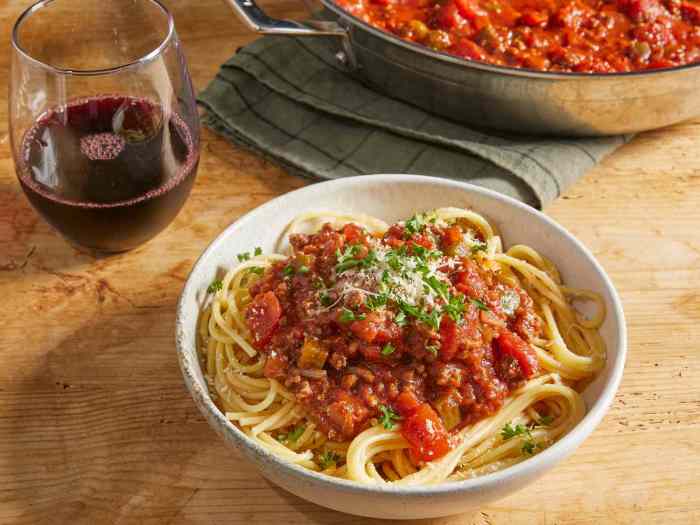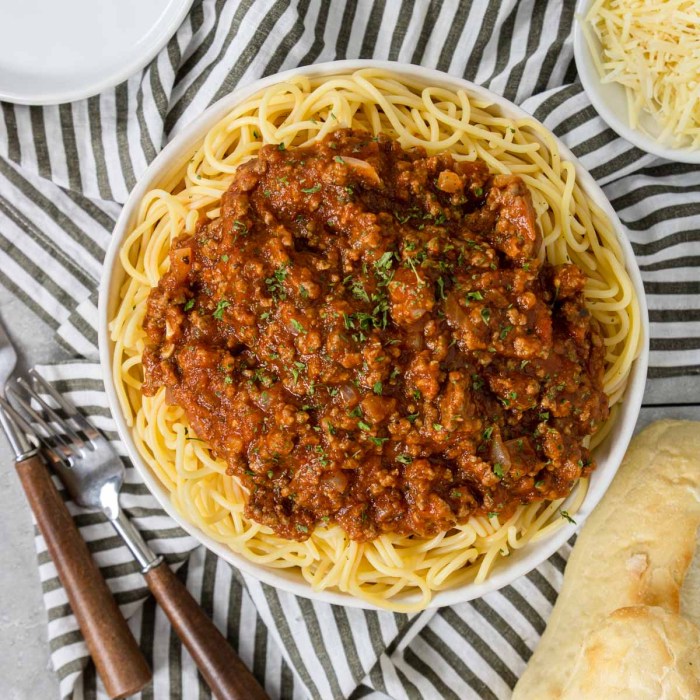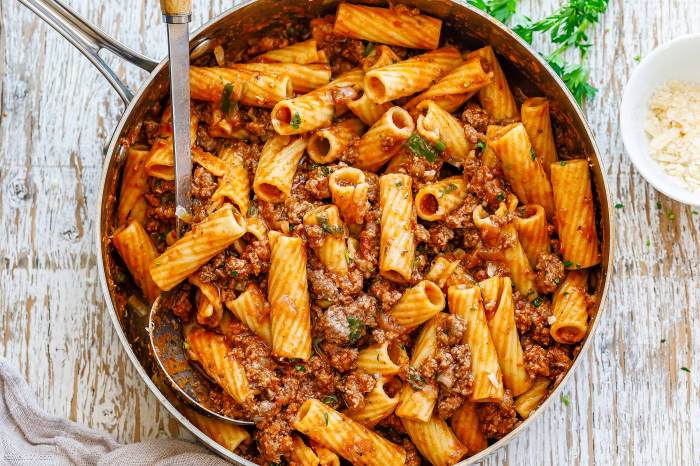Best Pasta Meat Sauce Recipe A Culinary Guide
Pasta Meat Sauce: A Culinary Journey

Source: allrecipes.com
Best pasta meat sauce recipe – Pasta meat sauce, a cornerstone of Italian-American cuisine, boasts a rich history intertwined with immigration and culinary adaptation. While its precise origins are debated, the sauce’s evolution reflects a blend of Italian traditions and readily available ingredients in its new American context. Variations abound, reflecting regional differences and individual preferences, making it a truly versatile and beloved dish.
Introduction to Pasta Meat Sauce, Best pasta meat sauce recipe

Source: momsdinner.net
The history of pasta meat sauce is a fascinating journey reflecting the evolution of Italian-American cuisine. Early iterations likely involved simpler combinations of readily available ingredients, gradually evolving into the complex and varied sauces we know today. Regional variations are significant, with Northern Italian versions often featuring lighter sauces with a focus on fresh herbs, while Southern Italian versions might incorporate richer, heartier ingredients and more robust flavors.
Key ingredients typically include ground meat (beef, pork, or a combination), tomatoes (fresh, canned, or a blend), onions, garlic, and a selection of herbs and spices.
Ingredient Selection and Preparation
Using high-quality ingredients is paramount for achieving a truly exceptional meat sauce. The flavor of the final product is directly impacted by the quality of its components. Selecting the right meat and tomatoes is crucial. For example, choosing lean ground beef with a good fat content ensures a rich flavor and proper browning, while high-quality canned tomatoes, such as San Marzano, offer a balanced sweetness and acidity ideal for pasta sauce.
Proper vegetable preparation is equally important. Finely chopping onions, garlic, carrots, and celery allows for even cooking and optimal flavor infusion.
| Tomato Type | Acidity | Flavor Profile | Best Use |
|---|---|---|---|
| San Marzano | Medium | Sweet, slightly acidic | Pasta sauce, pizza sauce |
| Roma | Medium-high | Rich, slightly tangy | Pasta sauce, stews |
| Plum | High | Tart, robust | Sauces, canning |
| Cherry | Variable | Sweet, slightly tart (depending on variety) | Salads, bruschetta, sauces |
Meat Sauce Cooking Methods
Proper browning of the meat is the foundation of a flavorful meat sauce. This step develops complex flavors and creates a rich base for the sauce. Simmering is essential for melding the flavors and creating a smooth, cohesive sauce. Low and slow cooking methods, typically simmering for several hours, are preferred for optimal flavor development and tenderizing of the meat.
Longer cooking times yield a deeper, more complex flavor profile, although shorter cooking times can be suitable for a quicker version of the sauce. The texture of the sauce also benefits from longer cooking times, becoming thicker and more concentrated.
- Brown ground meat in a large pot or Dutch oven over medium-high heat, breaking it up with a spoon.
- Add chopped onions, garlic, carrots, and celery and cook until softened.
- Stir in canned tomatoes, herbs, spices, and any additional liquids (wine, broth).
- Bring to a simmer, reduce heat to low, cover, and cook for at least 2-3 hours, or longer for a richer flavor.
- Season to taste with salt and pepper.
Flavor Enhancement and Variations
Herbs and spices play a crucial role in shaping the flavor profile of the meat sauce. Experimentation is key to finding your preferred blend. Common choices include oregano, basil, thyme, and bay leaf. Adding red wine contributes depth and complexity, while other liquids such as beef broth can enhance the richness. Numerous variations exist, allowing for customization to suit diverse tastes.
- Vegetarian Option: Replace ground meat with lentils, mushrooms, or a combination of vegetables for a hearty vegetarian sauce. Enhance the umami flavor with vegetable broth and soy sauce.
- Spicy Option: Incorporate chili flakes, crushed red pepper, or a diced jalapeño pepper for a spicy kick. Adjust the amount of spice according to preference.
- Creamy Option: Stir in heavy cream or crème fraîche during the last 15 minutes of simmering for a creamy, luxurious sauce. A touch of Parmesan cheese can also be added for extra richness.
Serving Suggestions and Presentation

Source: eatwell101.com
The best pasta for meat sauce depends on personal preference, but generally, thicker pasta shapes hold the sauce well. Presentation enhances the dining experience. A simple yet elegant presentation involves a generous portion of pasta tossed with the sauce, garnished with fresh herbs and grated Parmesan cheese.
| Pasta Type | Texture | Compatibility with Meat Sauce |
|---|---|---|
| Spaghetti | Long, thin strands | Excellent |
| Penne | Short, tube-shaped | Excellent |
| Rigatoni | Short, ridged tubes | Excellent |
| Bucatini | Thick, hollow spaghetti | Excellent |
Storage and Reheating
Proper storage is crucial to maintain the quality and safety of leftover meat sauce. Allow the sauce to cool completely before transferring it to airtight containers. Store it in the refrigerator for up to 4 days. Reheating can be done gently on the stovetop or in the microwave, ensuring that the sauce is heated thoroughly to prevent bacterial growth.
Homemade meat sauce generally lasts for 3-4 days in the refrigerator. Discard any sauce that shows signs of spoilage, such as mold or an off-putting odor.
Answers to Common Questions: Best Pasta Meat Sauce Recipe
Can I use canned tomatoes instead of fresh?
Yes, canned tomatoes are a convenient alternative. Choose high-quality canned tomatoes, preferably San Marzano, for the best flavor.
How long can I store leftover meat sauce?
Crafting the best pasta meat sauce recipe often involves building layers of flavor. A rich, complex sauce can be achieved by incorporating elements of a great red wine reduction, such as the technique detailed in this recipe for red wine sauce for beef with sweet wine. Adapting this approach, using less beef and perhaps adding mushrooms or vegetables, can elevate your pasta sauce to a whole new level of deliciousness.
Properly stored in an airtight container in the refrigerator, leftover meat sauce will last for 3-4 days.
Can I freeze meat sauce?
Yes, meat sauce freezes well. Allow it to cool completely before freezing in airtight containers for up to 3 months.
What kind of wine is best for a meat sauce?
A dry red wine, such as Cabernet Sauvignon or Merlot, works well. The alcohol cooks off, leaving behind rich flavor.












